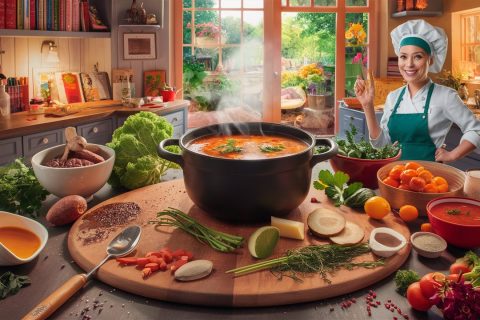Over the centuries, cast iron cookware has been a staple in kitchens worldwide. It is known for its durability, versatility, and ability to create mouthwatering dishes.
Cast iron pots and pans are essential for any home chef, whether searing steaks or baking bread. But with so many available options, choosing the right cast iron cookware can be overwhelming.
Fear not! We will dive deep into the world of cast iron cooking in this article, along with the factors you must consider when deciding which piece to use in your kitchen.
Cast iron cookware can elevate your culinary experience no matter how experienced or how soon you begin your culinary journey, regardless of your level.
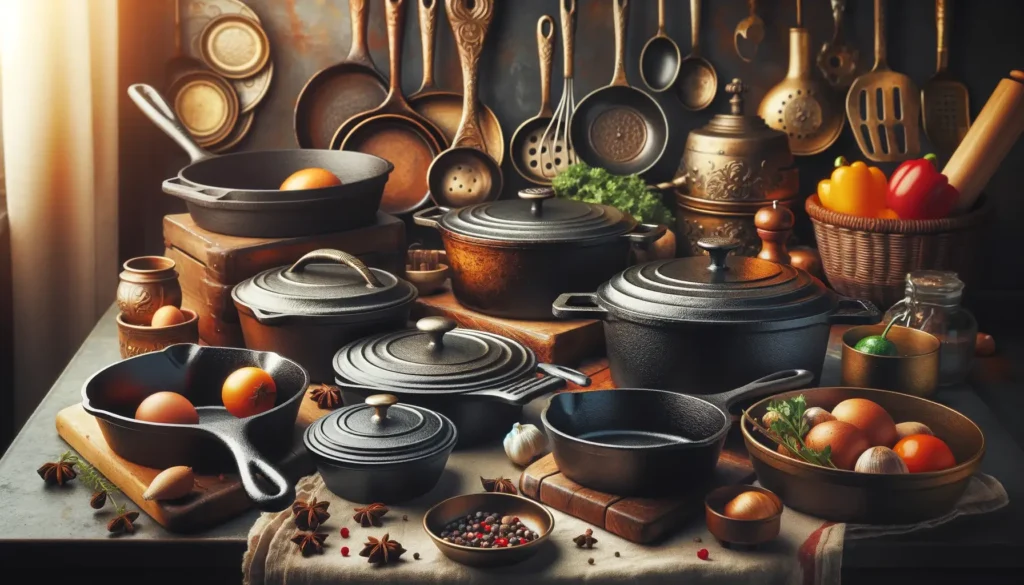
What is Cast Iron Cookware?
Cookware made of cast iron is known for its superior heat retention and even distribution. As a result, it is a staple in professional kitchens and at home.
The unique properties of cast iron also make it incredibly versatile; you can seamlessly transition from stovetop searing to oven roasting without missing a beat. The more you use cast iron, the better it gets, as it develops a natural non-stick surface over time through seasoning.
One exciting aspect of cast iron cookware is its durability. When properly cared for, these pieces can last for generations, becoming cherished family heirlooms.
Additionally, cast iron’s versatility extends beyond cooking; these pieces can be used to serve dishes directly from the stove or oven to the table, adding rustic charm to any meal.
Consider investing in high-quality cast iron cookware to elevate your culinary experience and create lasting memories at your dinner table by using it.
What is the best cookware for gas stoves? A Comprehensive Guide
Benefits of Cast Iron Cookware
Cookware made of cast iron has been a staple in kitchens for centuries, as it has various benefits. One of the key advantages of using cast iron cookware is its incredible durability – a well-maintained piece can last a lifetime and even be passed down through generations.
Furthermore, the launch iron distributes heat evenly across the cooking surface, ensuring the food cooks consistently from beginning to end.
Moreover, cooking with cast iron pans can add trace amounts of iron to your diet, essential for red blood cell production. This makes it especially beneficial for individuals with low iron levels or anemia.
Another lesser-known benefit of using cast iron cookware is its versatility – you can use it on the stovetop, in the oven, or even over an open flame while camping.
With proper care and maintenance, investing in high-quality cast iron cookware can enhance your cooking experience and elevate your dishes.
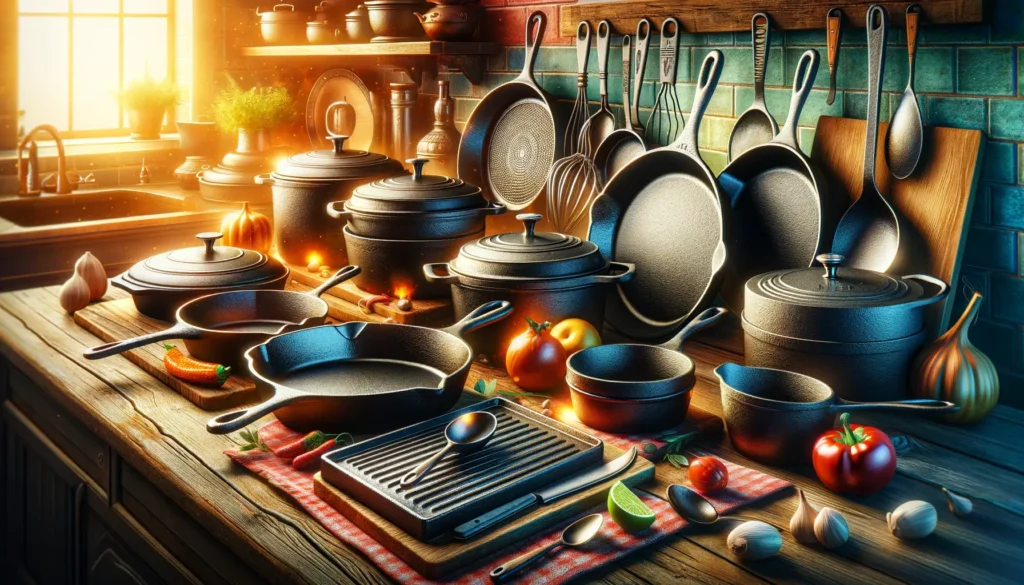
Types of Cast Iron Cookware
When it comes to cast iron cookware, there’s a world of options. One popular type is the classic cast iron skillet, known for its versatility in cooking everything from seared steaks to fluffy pancakes.
Another favorite is the cast iron Dutch oven, loved for its ability to simmer hearty stews and bake crusty bread with equal finesse. If you’re looking for something more specialized, consider a cast iron skillet for perfectly grilled meats and veggies or a cast iron wok for sizzling stir-fries that pack a punch.
Each type of cast iron cookware brings unique benefits to the kitchen table. The deep walls of a Dutch oven make it ideal for slow-cooking dishes that require tenderizing over time, while the smooth surface of a skillet ensures even heat distribution for those picture-perfect grill marks.
And let’s remember the trusty cast iron panini press, which takes your sandwich game to new heights with crispy exteriors and gooey fillings that meld together in delicious harmony.
So whether you’re a home chef looking to expand your culinary horizons or a seasoned pro seeking dependable tools, there’s a piece of cast iron cookware out there waiting for you.
Tips for Caring for Cast Iron Cookware
Cookware made of cast iron needs to be cared for properly to ensure longevity and performance. However, It is imperative to remember that it is always a good idea to hand wash your cast iron skillet with hot water and a stiff toothbrush, avoiding harsh soaps that may strip the seasoning.
Furthermore, it is essential to dry your cookware thoroughly after washing to prevent rusting. Additionally, it’s important to season your cast iron regularly by applying a thin layer of oil and baking it in the oven at a high temperature.
If you plan to store your cast iron cookware, avoid stacking the pieces on top of each other, as this can cause the seasoning to become damaged. Instead, keep them dry with good air circulation to prevent moisture buildup.
Lastly, if you notice any rust or stubborn food residue on your cast iron, don’t worry – scrub it off with a mixture of coarse salt and oil until clean. Following these tips ensures that your cast iron cookware will serve you well for many years.
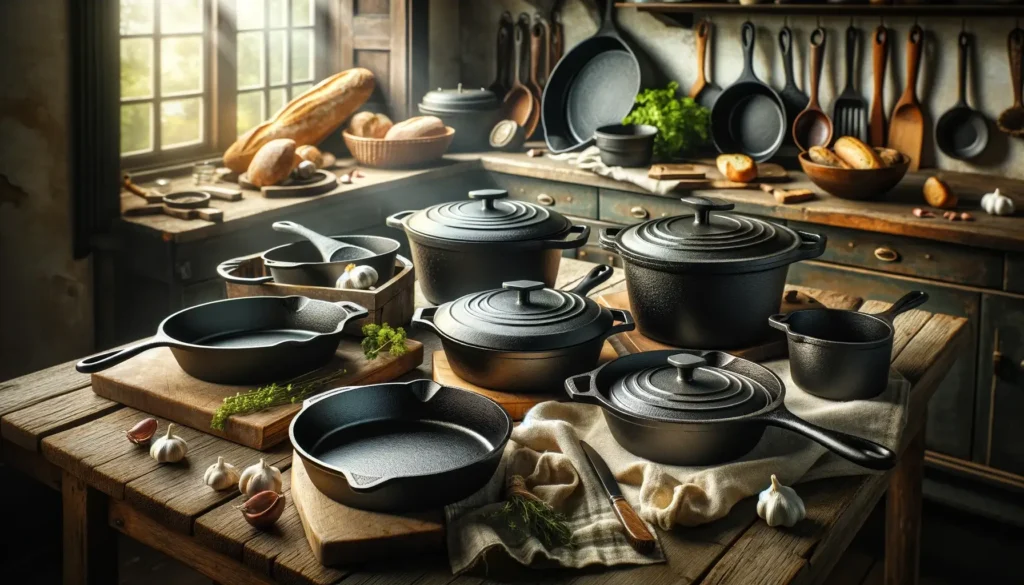
Considerations for Selecting the Right Cookware
When selecting the right cookware, there are several key considerations to remember. Firstly, think about the material of the cookware and how it will affect your cooking style.
The durability and heat retention properties of cast iron cookware make it great for searing and browning meats. Secondly, determine what size and shape of pots and pans you need based on your typical cooking needs. A versatile set with various sizes can help you prepare multiple dishes effectively.
There is also an important consideration regarding the maintenance needed for different types of cookware. Cast iron needs seasoning to maintain its non-stick properties.
At the same time, stainless steel may be easier to clean but not as naturally non-stick. Additionally, consider compatibility with your stove type – some materials, like copper, are better suited for gas stoves than induction cooktops. The right cookware will align with your cooking habits and preferences if you consider these factors.
Seasoning and maintenance tips
Seasoning and maintenance are crucial aspects of owning cast iron cookware. To ensure your pieces last a lifetime, seasoning them properly is essential.
Start by washing your new purchase with warm water and mild soap, then dry thoroughly. Oil the pan or pot before heating it for about an hour in the oven. This process creates a natural non-stick coating that improves with each use.
In terms of maintenance, always hand wash your cast iron cookware immediately after use; avoid using harsh soaps or abrasive sponges that can strip away the seasoning. Instead, utilize hot water and a gentle brush to clean any stuck-on residue.
Once cleaned, make sure to dry the piece to prevent rusting completely. Lastly, store your cast iron in a dry place away from moisture to maintain its seasoned finish and prolong its lifespan for generations.
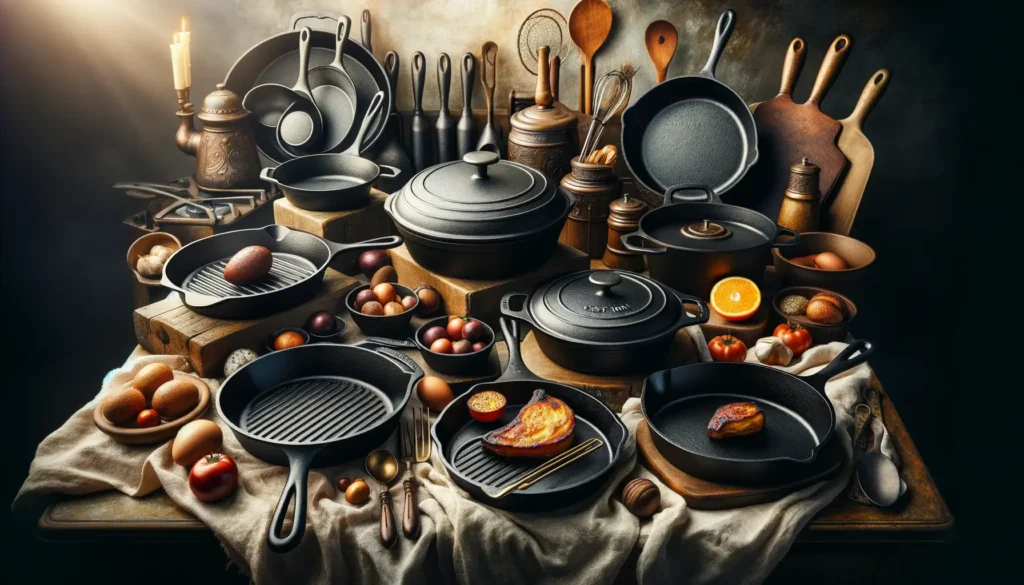
Price range and budget-friendly options
When choosing cast iron cookware, the price range can vary significantly. While high-end brands offer top-quality products at a premium price, budget-friendly options are also available without compromising performance.
Considering your cooking needs and frequency when deciding on a budget is essential, as investing in durable cast iron cookware can be a long-term, cost-effective choice.
Many reputable brands offer affordable cast iron cookware that performs exceptionally well for those looking for budget-friendly options. The best way to find quality pieces within your budget is to compare prices and shop for the best deal.
Further, pre-seasoned cast iron cookware can save you time and effort in seasoning the pans while retaining all the benefits of cast iron cooking.
The 9 Best Black Microwaves Comprehensive Review
Reviews and recommendations from experts
Experts in the culinary world agree that when choosing the right cast iron cookware, seeking reviews and recommendations from trusted sources is essential.
It is common for professional chefs to seek the advice of experts in the field to guide them toward high-quality items that can endure the rigors of a busy kitchen. From seasoned food bloggers to kitchen appliance reviewers, these experts provide valuable insights based on extensive testing and experience.
When browsing expert reviews, one key aspect to consider is looking for detailed feedback on heat distribution, durability, and cooking performance.
By comparing expert opinions, readers can understand which cast iron cookware brands consistently deliver superior results in various cooking scenarios.
Consumers can learn about unique features or design elements that make certain products stand out, helping them make informed decisions.
In today’s saturated market of cast iron cookware options, relying on expert recommendations can save time and money by narrowing down choices to those vetted for quality and reliability.
Whether looking for a versatile skillet or a sturdy Dutch oven, consulting reviews from industry professionals is a valuable tool in navigating the vast array of options available while ensuring that your investment in cast iron cookware will stand the test of time in your kitchen.
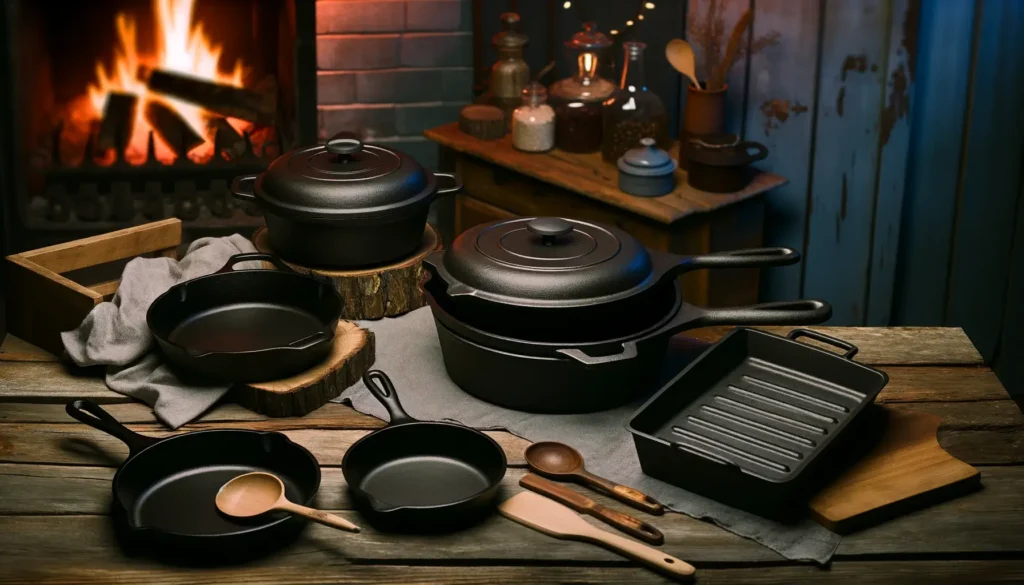
Conclusion for Cast Iron Cookware
In conclusion, making an informed decision regarding selecting the right cast iron cookware is essential for novice and experienced cooks.
Cast iron can be chosen based on specific cooking needs and preferences by understanding traditional versus enameled cast iron. When making this decision, it’s essential to consider factors like heat retention, durability, and maintenance requirements.
Moreover, consider the importance of proper care and seasoning of your cast iron cookware. Investing time in maintaining these pieces will enhance their performance and prolong their lifespan significantly.
Exploring recipes and techniques best suited for cast iron cooking can further elevate your culinary experience. Ultimately, educating yourself on these aspects will enable you to make a well-informed decision that aligns with your cooking style and goals.
FAQs About Cast Iron Cookware
What size of cast iron cookware should I choose?
Consider the number of people you typically cook for and the size of your stovetop to determine the correct size.
Are there different types of cast iron cookware available?
Yes, depending on your cooking needs, you can choose skillets, Dutch ovens, griddles, and more.
How do I know if the cast iron cookware is seasoned correctly?
Properly seasoned cast iron will have a smooth, non-stick surface that appears glossy and dark.
Can I use soap to clean my cast iron cookware?
It is recommended to avoid using soap as it can strip the seasoning; instead, use hot water and a stiff brush to clean.
Should I choose pre-seasoned or unseasoned cast iron cookware?
Pre-seasoned cast iron is ready to use immediately. In contrast, unseasoned cast iron requires seasoning before use based on manufacturer instructions.
How do I maintain the seasoning of my cast iron cookware?
Avoid cooking acidic foods for prolonged periods. Regularly apply a thin layer of oil after each use to maintain the seasoning.
Can I use my cast iron cookware on all stovetops?
Cast iron is versatile and can be used on gas, electric, ceramic, and induction stovetops.
What are some common mistakes to avoid when using cast iron cookware?
Avoid sudden temperature changes, leaving food sitting in the pan for too long after cooking, and using metal utensils that can scratch the surface.





